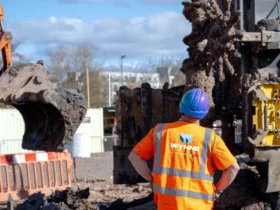A family owned construction company which works mostly in the Welsh speaking region of North West Wales is reaping the benefits of employing bilingual staff.
TIR Construction Ltd, based at Penrhyndeudraeth, employs 18 staff, including three apprentices who are seeking Level 2 and 3 City & Guilds Apprenticeships in Plastering and Joinery delivered bilingually by Grŵp Llandrillo Menai.
The company is run by Tony and Tania Edwards, who have employed a number of apprentices over the years, including their son, Iolo, 33, who is a qualified bricklayer and site manager.
“Having employees who speak Welsh is very advantageous to our business and employing apprentices has also helped our company to secure contracts,” said company director Tania Edwards.
“We do a lot of work for Gwynedd Council and other clients in North West Wales who prefer to communicate in Welsh, so it’s important that our apprentices have the opportunity to do their apprenticeships bilingually or totally in the Welsh language if they prefer.
“Employing good apprentices who are committed to learning their trade and are loyal to the company is definitely beneficial.”
TIR Construction Ltd is being highlighted by Coleg Cymraeg Cenedlaethol and the National Training Federation of Wales (NTfW) as a champion of bilingualism in the workplace.
Coleg Cymraeg Cenedlaethol leads the development of Welsh medium and bilingual education and training in the post-compulsory sector in Wales whilst the NTfW represents work-based learning providers across Wales.
TIR Construction Ltd prides itself on delivering high quality, sustainable construction projects across a diverse range of sectors which include housing, commercial, leisure, education and industrial.
The company’s portfolio ranges from traditional building contracts, new builds and renovations to the design and build of large scale landmark developments in North Wales.
The company works closely with Steve Adams, work placement officer for Grŵp Llandrillo Menai and Aled Hughes, customer engagement adviser with the CITB, which offers grants for construction training.
“TIR Construction has always been very supportive of bilingual apprenticeships,” said Mr Adams. “Completing an apprenticeship is critical in the construction industry because an apprentice must be able to prove their occupational competency to get work.
“Grŵp Llandrillo Menai is committed to providing opportunities and supporting apprentices to do their apprenticeships through the medium of Welsh. However, we often find that whilst apprentices are happy to do their verbal assessments in Welsh, they choose to submit their written work in English.
“Many of our tutors and assessors are bilingual and we would like more apprentices to take the opportunity to do their apprenticeships in Welsh because it can open more doors for them. Being able to speak Welsh to an employer is definitely beneficial in North Wales.”
Mr Hughes said TIR Construction has been very supportive of apprenticeships and develops its apprentices, recruited from the local area, by placing them to work with and learn from an experienced member of staff. Attendance and achievement grants are available from the CITB for Construction Apprenticeships.
Ryan Evans, the NTfW’s bilingual champion, said: “Many workplaces are becoming more bilingual, which can be very beneficial to employers, especially when providing services to Welsh speaking customers.
“Completing an apprenticeship bilingually or in Welsh can increase an individual’s confidence to work in both languages and their employability, whilst also being a great asset to their employer.
“TIR Construction Ltd is an excellent role model for apprenticeships, highlighting the benefits of learning and working bilingually in the workplace.”
Dr Dafydd Trystan, from the Coleg Cymraeg Cenedlaethol, said: “Highlighting successful employers who are active in the apprenticeship sector is a vital tool in showing businesses and individuals that it is both possible and advantageous to support bilingual apprentices.
“With the Welsh Government’s target to reach one million Welsh speakers by 2050, it has never been more important for employers and their employees to develop their bilingual skills to increase their business and employability prospects respectively.”








Leave a Reply
View Comments